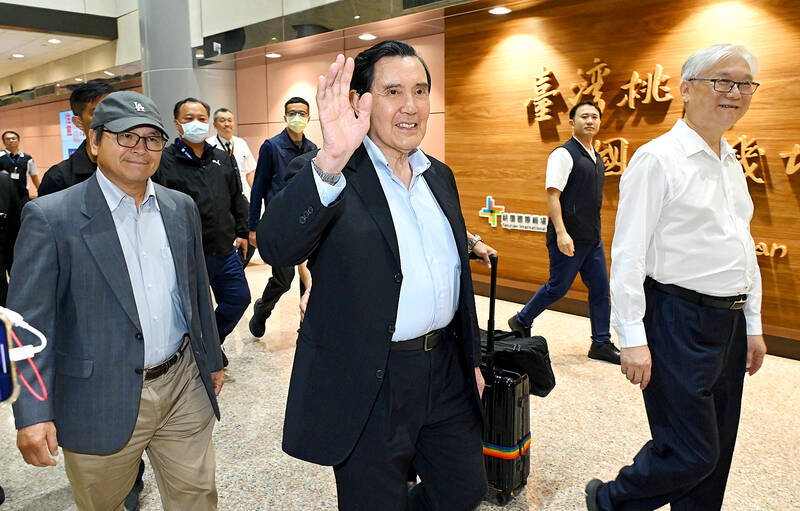Former president Ma Ying-jeou (馬英九) said in China on Thursday that he advocates for “peaceful and democratic unification” and called for the need to “respect the will of the Taiwanese people” at an event also attended by Beijing’s top official in charge of Taiwan affairs.
“My advocacy is that the two sides of the Taiwan Strait should pursue peaceful and democratic unification,” Ma said during an event held at the Dunhuang Academy in the Chinese province of Gansu.
“Peaceful” means not using force or the threat of force, while “democratic” means to “respect the will of the Taiwanese people,” he said.

Photo: Liu Hsin-de, Taipei Times
Ma of the Chinese Nationalist Party (KMT), who served as president from 2008 to 2016, said he was “pleased” to have continuously worked over the years to promote cross-strait relations.
The event in Dunhuang was part of Ma’s fourth visit to China since leaving office, a trip that began on June 14 and concluded on Friday with his return to Taiwan.
China’s Taiwan Affairs Office Director Song Tao (宋濤) also attended the event, and in response to Ma’s remarks said that “Taiwan belongs to all Chinese people on both sides of the Strait,” and the future of Taiwan “must be jointly decided by all of China’s sons and daughters across the Strait.”
Reiterating China’s opposition to Taiwanese independence, Song said that Taiwan must adhere to the “one China” principle and the so-called “1992 consensus,” adding that “the future of cross-strait relations must be firmly held in the hands of the Chinese people on both sides.”
The “1992 consensus” refers to a tacit understanding between the KMT and the Chinese Communist Party (CCP) that both sides of the Strait acknowledge there is “one China,” with each side having its own interpretation of what “China” means.
The Democratic Progressive Party has never acknowledged the “1992 consensus,” saying that Beijing does not allow for the interpretation of “China” as the Republic of China, and that accepting it would imply agreement with China’s claim over Taiwan.
Responding to media queries on Ma’s political advocacy, the Mainland Affairs Council said: “No comment.”
During the two-week visit to China, Ma led a group of Taiwanese students to participate in various events, including the Straits Forum.
That drew criticism from the council, which urged him not to serve as a propaganda tool for Beijing’s “united front” efforts targeting Taiwan.

A small number of Taiwanese this year lost their citizenship rights after traveling in China and obtaining a one-time Chinese passport to cross the border into Russia, a source said today. The people signed up through Chinese travel agencies for tours of neighboring Russia with companies claiming they could obtain Russian visas and fast-track border clearance, the source said on condition of anonymity. The travelers were actually issued one-time-use Chinese passports, they said. Taiwanese are prohibited from holding a Chinese passport or household registration. If found to have a Chinese ID, they may lose their resident status under Article 9-1

Taiwanese were praised for their composure after a video filmed by Taiwanese tourists capturing the moment a magnitude 7.5 earthquake struck Japan’s Aomori Prefecture went viral on social media. The video shows a hotel room shaking violently amid Monday’s quake, with objects falling to the ground. Two Taiwanese began filming with their mobile phones, while two others held the sides of a TV to prevent it from falling. When the shaking stopped, the pair calmly took down the TV and laid it flat on a tatami mat, the video shows. The video also captured the group talking about the safety of their companions bathing

A classified Pentagon-produced, multiyear assessment — the Overmatch brief — highlighted unreported Chinese capabilities to destroy US military assets and identified US supply chain choke points, painting a disturbing picture of waning US military might, a New York Times editorial published on Monday said. US Secretary of Defense Pete Hegseth’s comments in November last year that “we lose every time” in Pentagon-conducted war games pitting the US against China further highlighted the uncertainty about the US’ capability to intervene in the event of a Chinese invasion of Taiwan. “It shows the Pentagon’s overreliance on expensive, vulnerable weapons as adversaries field cheap, technologically

Starting on Jan. 1, YouBike riders must have insurance to use the service, and a six-month trial of NT$5 coupons under certain conditions would be implemented to balance bike shortages, a joint statement from transportation departments across Taipei, New Taipei City and Taoyuan announced yesterday. The rental bike system operator said that coupons would be offered to riders to rent bikes from full stations, for riders who take out an electric-assisted bike from a full station, and for riders who return a bike to an empty station. All riders with YouBike accounts are automatically eligible for the program, and each membership account